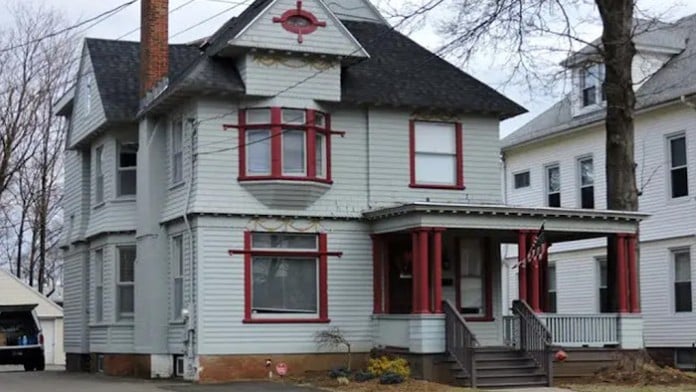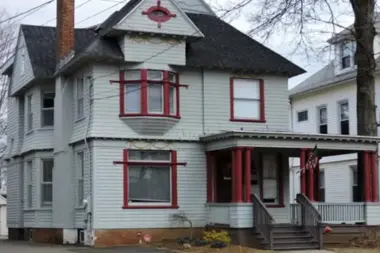This place is a joke. It's more like an apartment for a reasonable price because u get your own room. There's maybe a house meeting once a month if the "house manager" or whatever u want to call him, calls for one.I think it's up for sale and the owners can care less about ...
About The Step Up Inn
Step Up Inn is a halfway house based in West Haven, Connecticut, that serves women aged 18 to 70 in varying stages of recovery. The house also accommodates working professionals and individuals struggling with co-occurring mental and physical health conditions. Private health insurance is accepted along with cash and self-pay.
Sober Living By the Sea
You’ll find this home just four blocks from the beach in a safe, peaceful neighborhood. You can smell the sea air which in itself can often be enough to lift the spirits even just a little.
There’s off-street parking if you’ve arrived by car and plenty of security measures for your safety including cameras by all the entrances, automatic door locks, and key-coded entryways for guests. Sprinkler systems and smoke, carbon monoxide, and fire detectors are also installed.
All the bedrooms feature ceiling fans, air conditioning, and free WIFI so you can keep up with any work or study commitments during your stay, or keep in touch with your loved ones.
As for the rest of the house, you’ll find it features a fully equipped laundry room, self-service kitchen, a meeting room, a yoga and workout room, as well as bright, spacious bedrooms for its residents.
How The Halfway House is Run and What to Expect
All residents can expect to engage in mandatory morning meetings, random drug screenings, and daily breathalyzer tests as part of a structured recovery environment.
Experiential therapies and activities like yoga and massage therapy are available to support you in your recovery experience. You can also be connected to intensive outpatient programs (IOP), life skills training as well as independent counselors, psychiatrists, and other support resources.
Facility Overview
Latest Reviews
Rehab Score
Gallery


Other Forms of Payment
Self-pay involves paying for treatment out of your own pocket. You can use savings or credit, get a personal loan, or receive help from family and friends to fund your treatment. If you don't have insurance or your insurance plan doesn't cover a specific program, self-pay can help ensure you still get the care you need.
Private insurance refers to any kind of healthcare coverage that isn't from the state or federal government. This includes individual and family plans offered by an employer or purchased from the Insurance Marketplace. Every plan will have different requirements and out of pocket costs so be sure to get the full details before you start treatment.
Addiction Treatments
Levels of Care
Completing a drug or alcohol rehab program shouldn't spell the end of substance abuse treatment. Aftercare involves making a sustainable plan for recovery, including ongoing support. This can include sober living arrangements like halfway houses, career counseling, and setting a patient up with community programs like Alcoholics Anonymous (AA) or Narcotics Anonymous (NA).
he Step Up Inn is managed with mandatory morning meetings, AA/NA mandatory outside meetings as well as daily breathalyzer tests. We operate a 9 PM curfew along with random drug testing. At The Step Up Inn, we pride ourselves on having among the best standards anywhere in the state of Connecticut, which is one of the reasons we receive such positive reviews from our successful clients and industry peers. As part of our sober living plan we offer in-house group and individual Counseling, weekly Life Skills Group, Yoga, and Massage Therapy. The Step Up Inn provides a safe and productive journey back into the world, clear and free of substance.
Treatments
A combined mental health and substance abuse rehab has the staff and resources available to handle individuals with both mental health and substance abuse issues. It can be challenging to determine where a specific symptom stems from (a mental health issue or an issue related to substance abuse), so mental health and substance abuse professionals are helpful in detangling symptoms and keeping treatment on track.
If the body experiences withdrawal symptoms in the absense of alcohol, they are considered alcohol dependent. This is one of the defining characteristics of alcoholism, also knosn as alcohol use disorder (AUD). If a person has reached this state, they typically need professional treatment to recover. Alcohol rehab in Connecticut can provide a safe, supervised detox to withdraw from alcohol, followed by inpatient or outpatient rehab, then a maintenance program.
Drug rehab in Connecticut provides the professional support that is often necessary to break free from drug dependency. With proper treatment, individuals can make changes that restore balance and health to their lives and achieve long-term recovery.
Programs
Adult rehab programs include therapies tailored to each client's specific needs, goals, and recovery progress. They are tailored to the specific challenges adult clients may face, including family and work pressures and commitments. From inpatient and residential treatment to various levels of outpatient services, there are many options available. Some facilities also help adults work through co-occurring conditions, like anxiety, that can accompany addiction.
Young adulthood can be an exciting, yet difficult, time of transition. Individuals in their late teens to mid-20s face unique stressors related to school, jobs, families, and social circles, which can lead to a rise in substance use. Rehab centers with dedicated young adult programs will include activities and amenities that cater to this age group, with an emphasis on specialized counseling, peer socialization, and ongoing aftercare.
Rehabs for women provide a safe, nurturing space for female clients to heal. These treatment programs consider the specific obstacles that women can face during recovery and place a special emphasis on mental, social, physical, and reproductive health. They explore how each woman's experience has shaped the trajectory of their substance use, addressing issues such as sexual abuse and past trauma.
Clinical Services
Experiential therapy is a form of therapy in which clients are encouraged to surface and work through subconscious issues by engaging in real-time experiences. Experiential therapy departs from traditional talk therapy by involving the body, and having clients engage in activities, movements, and physical and emotional expression. This can involve role-play or using props (which can include other people). Experiential therapy can help people process trauma, memories, and emotion quickly, deeply, and in a lasting fashion, leading to substantial and impactful healing.
Group therapy is any therapeutic work that happens in a group (not one-on-one). There are a number of different group therapy modalities, including support groups, experiential therapy, psycho-education, and more. Group therapy involves treatment as well as processing interaction between group members.
In individual therapy, a patient meets one-on-one with a trained psychologist or counselor. Therapy is a pivotal part of effective substance abuse treatment, as it often covers root causes of addiction, including challenges faced by the patient in their social, family, and work/school life.
Life skills trainings involve all the skills a person must have in order to function successfully in the world. These include time management, career guidance, money management, and effective communication. Truly successful addiction recovery is based on the ability to not only live substance-free, but to thrive. Life skills teaches the practical necessities of functioning in society, which sets clients up for success in life, and therefore sobriety.
Amenities
-
Yoga Studio
-
Wifi
-
Private Rooms
-
Hiking
Staff & Accreditations
Staff
Linda Gherlone
Regional Manager and Owners Representative
Louis Gherlone
Director of Operations
Alexa Gherlone
Owner
Accreditations

The Commission on Accreditation of Rehabilitation Facilities (CARF) is a non-profit organization that specifically accredits rehab organizations. Founded in 1966, CARF's, mission is to help service providers like rehab facilities maintain high standards of care.
CARF Accreditation: Yes

The National Association of Addiction Treatment Providers (NAATP) is a professional association that represents organizations in the field of addiction services. Founded in 1978, NAATP's mission is to advance addiction services and ensure that high-quality addiction treatment is available and accessible.
NAATP Member: Yes

State Licenses are permits issued by government agencies that allow rehab organizations to conduct business legally within a certain geographical area. Typically, the kind of program a rehab facility offers, along with its physical location, determines which licenses are required to operate legally.
State License: Connecticut
Contact Information
541 Washington Ave
West Haven, CT 06516